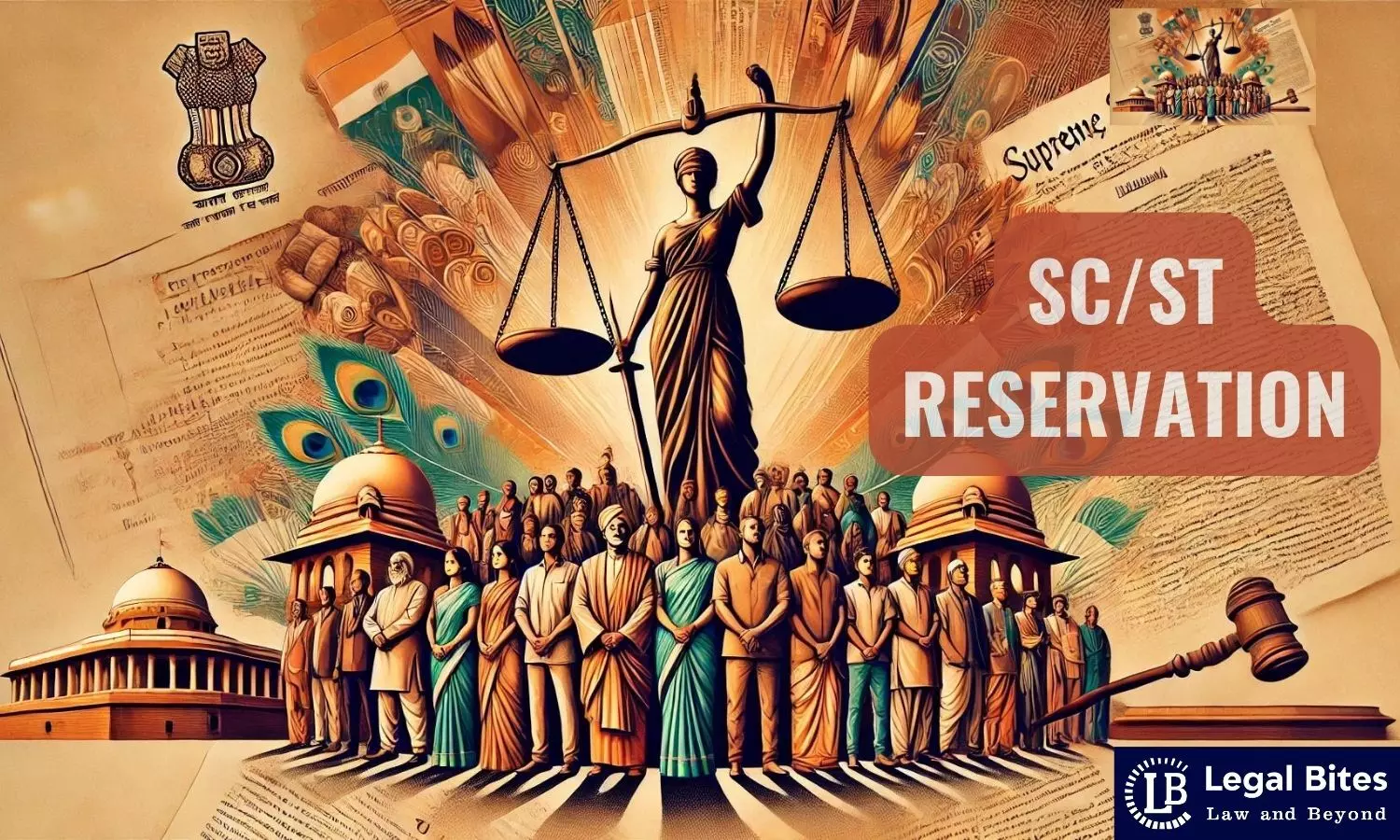Landmark Supreme Court Verdict on SC/ST Quota: Sub-Categorization Allowed | State of Punjab vs Davinder Singh (2024)
Supreme Court's landmark verdict allowing sub-categorization of SC/ST reservations for equitable distribution of benefits.

The Supreme Court of India has delivered a landmark judgment allowing the sub-categorization of Scheduled Castes (SC) and Scheduled Tribes (ST) for reservation purposes. This ruling marks a significant departure from the 2004 judgment in E V Chinnaiah vs State of Andhra Pradesh (2004), which prohibited the sub-classification of SCs and STs for reservation.
Case Name
State of Punjab vs Davinder Singh (Citation: 2024 INSC 562)
Quorum
The judgment was delivered by a seven-judge bench comprising:
- Chief Justice of India (CJI) D.Y. Chandrachud
- Justice B.R. Gavai
- Justice Vikram Nath
- Justice B.M. Trivedi (dissenting)
- Justice Pankaj Mithal
- Justice Manoj Misra
- Justice Satish Chandra Sharma
Decided On
The verdict was pronounced on July 28, 2024.
Overruled
The judgment overruled the 2004 decision in E V Chinnaiahvs State of Andhra Pradesh, which stated that there cannot be sub-classification within SCs and STs for reservation.
Arguments
- Petitioners: Advocated for sub-categorization to ensure that benefits reach the most disadvantaged sections within the SC/ST communities. They argued that a blanket reservation policy results in the more advanced sub-groups within these categories reaping most of the benefits.
- Respondents: Contended that sub-categorization could lead to further divisions within already marginalized communities and undermine the purpose of reservations.
Decision
In a 6:1 majority ruling, the Supreme Court held that the sub-categorization of SCs and STs for reservation is constitutionally valid. The majority opinion stated that the purpose of reservation is to uplift the most disadvantaged, and sub-categorization ensures equitable distribution of benefits.
Important Remarks by Judges
Chief Justice of India (CJI) D.Y. Chandrachud
- The ruling emphasized that “the power of Parliament to vary the list includes not merely the power to exclude or include ‘any caste, race or tribe’ but also the power to exclude or include ‘parts of or groups within any caste, race or tribe… Article 341(2) bars the State Legislature from removing or adding castes from and to the List respectively. Sub-classification within the Scheduled Castes for the purposes of affirmative action, including reservation, does not include or exclude any caste or group from the List”.
- It was stated, “the State, in exercise of its power under Articles 15 and 16, is free to identify the different degrees of social backwardness and provide special provisions (such as reservation) to achieve the specific degree of harm identified…”.
- The State must base sub-classification on “quantifiable and demonstrable data bearing on levels of backwardness and representation in the services of the State”. The decision of the State is subject to judicial review.
- While the State can sub-classify based on inadequate representation of certain castes, it “must establish that the inadequacy of representation of a caste/group is because of its backwardness”.
Justice B.R. Gavai
- Speaking on the ‘creamy layer’ within the SCs and STs, Justice Gavai said the state must evolve a policy to identify the creamy layer among the Scheduled Castes and Scheduled Tribes category and exclude them from the fold of affirmative action.
- Justice Gavai highlighted that there are categories within the scheduled castes and tribes that have been oppressed for centuries, and state governments must identify them.
- He also noted that the criteria for identifying the creamy layer among SCs/STs should differ from those used for the Other Backward Castes (OBCs).
Dissent by Justice Bela M. Trivedi
Justice Bela M. Trivedi, in her dissenting judgment, asserted that the law laid down by the five-judge bench in Chinnaiah, “is the correct law and deserves to be confirmed.” She emphasized that there was no reason for the bench in Davinder Singh to make the reference “that too without assigning any reason, much less cogent reason for their disagreement.” Justice Trivedi's dissent highlighted the importance of adhering to established legal precedents and cautioned against fragmenting the SC/ST communities through sub-categorization.
Impact
This landmark decision is poised to have far-reaching implications:
- Equitable Distribution: It will enable a more equitable distribution of reservation benefits, ensuring that the most marginalized within SC/ST communities receive adequate support.
- Policy Reformation: States may now formulate policies to sub-categorize SC/ST reservations, potentially reshaping the landscape of affirmative action in India.
- Legal Precedent: This ruling sets a legal precedent, providing a framework for future policies and legislation concerning reservations.
- Social Dynamics: While aiming for inclusivity, the decision may also lead to new challenges in social dynamics within these communities.
Conclusion
The Supreme Court's ruling on sub-categorization of SC/ST reservations is a significant step towards ensuring social justice and equity. By overruling the 2004 judgment, the court has paved the way for more nuanced and targeted affirmative action policies that can better serve the diverse needs of India's marginalized communities. Justice Trivedi's dissent serves as a reminder of the importance of consistency in legal interpretations and the potential complexities involved in implementing such transformative policies.

